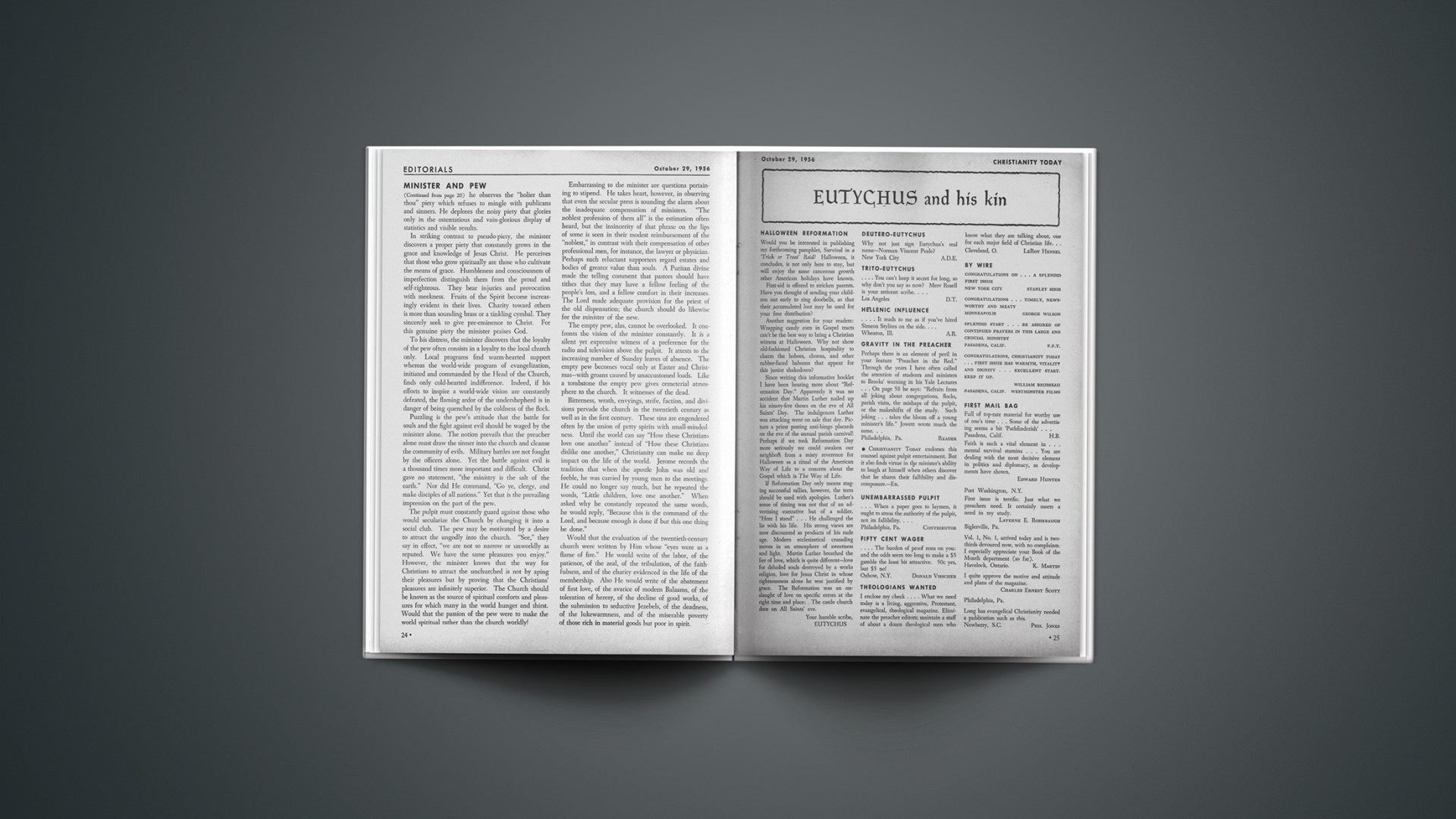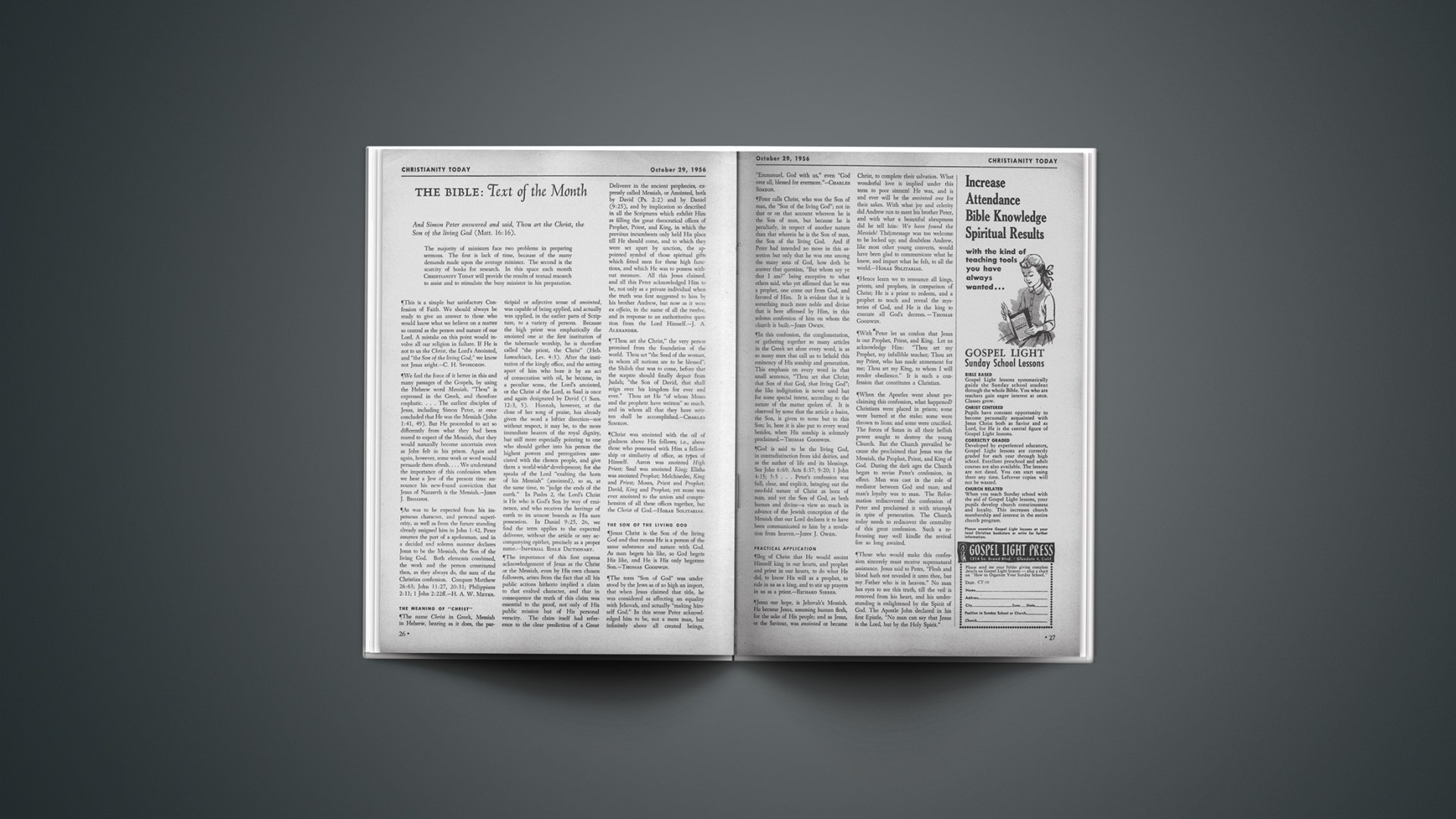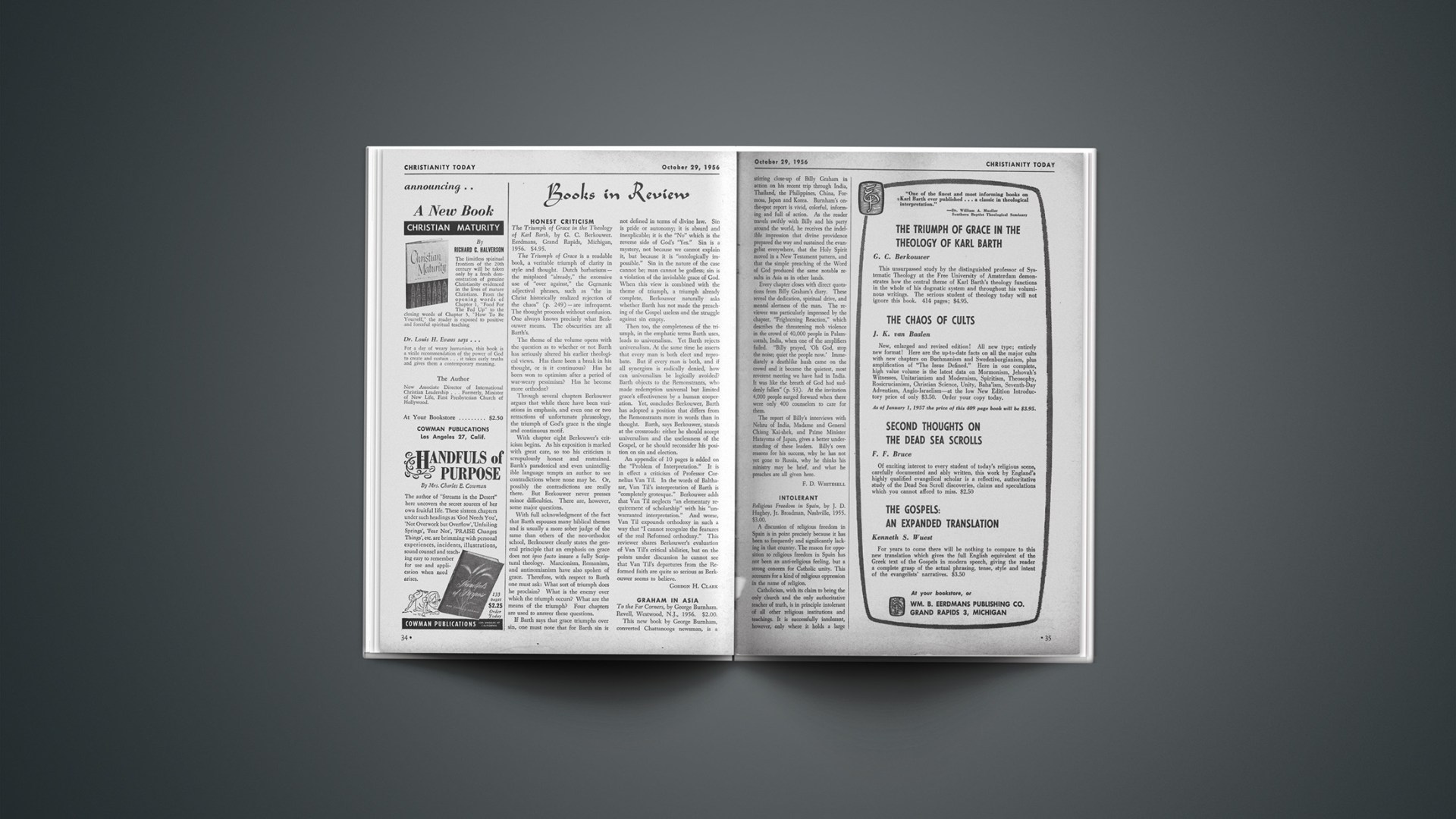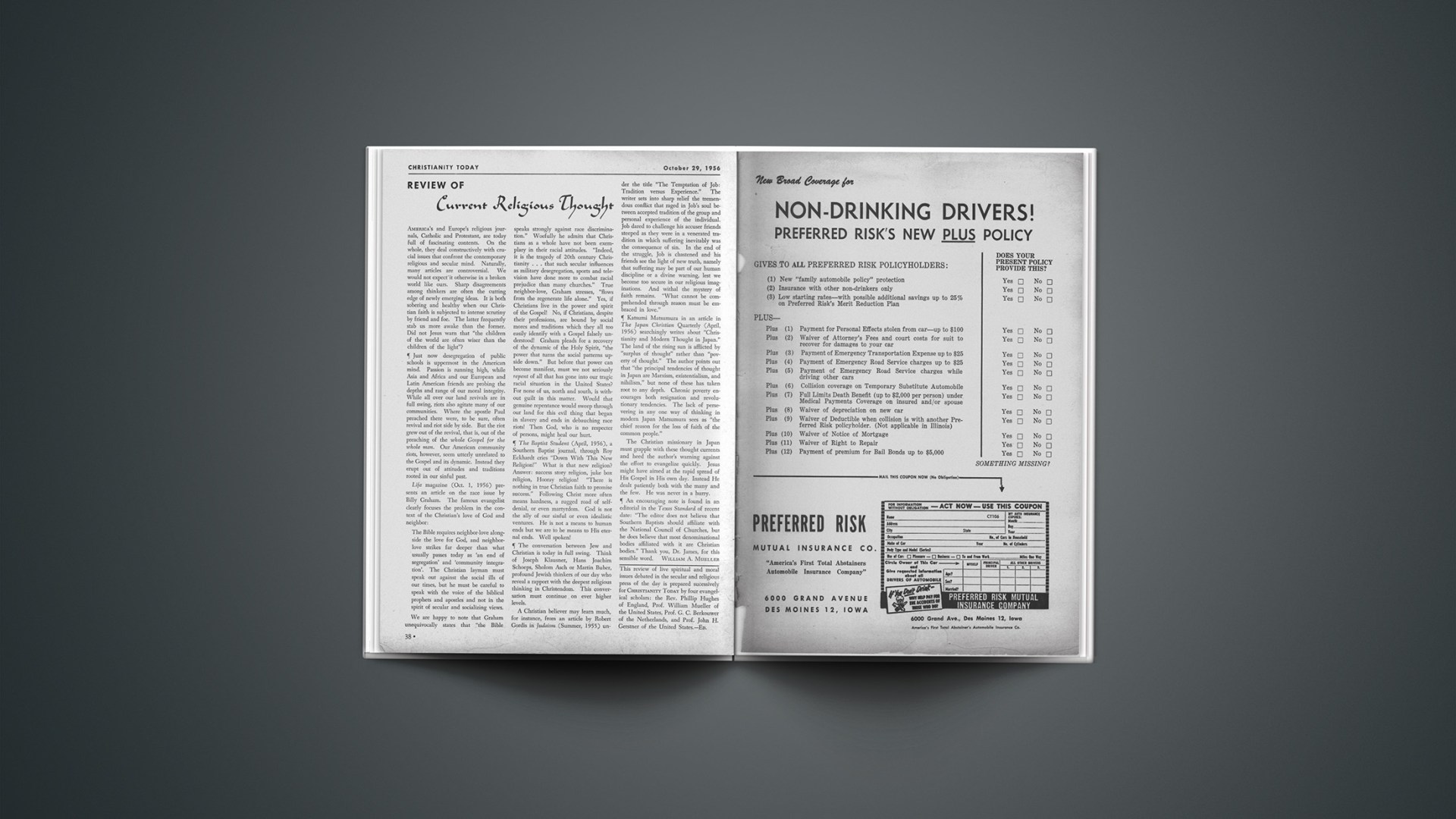HALLOWEEN REFORMATION
Would you be interested in publishing my forthcoming pamphlet, Survival in a ‘Trick or Treat’ Raid? Halloween, it concludes, is not only here to stay, but will enjoy the same cancerous growth other American holidays have known.
First-aid is offered to stricken parents. Have you thought of sending your children out early to ring doorbells, so that their accumulated loot may be used for your free distribution?
Another suggestion for your readers: Wrapping candy corn in Gospel tracts can’t be the best way to bring a Christian witness at Halloween. Why not show old-fashioned Christian hospitality to charm the hoboes, clowns, and other rubber-faced baboons that appear for this junior shakedown?
Since writing this informative booklet I have been hearing more about “Reformation Day.” Apparently it was no accident that Martin Luther nailed up his ninety-five theses on the eve of All Saints’ Day. The indulgences Luther was attacking went on sale that day. Picture a priest posting anti-bingo placards on the eve of the annual parish carnival! Perhaps if we took Reformation Day more seriously we could awaken our neighbors from a misty reverence for Halloween as a ritual of the American Way of Life to a concern about the Gospel which is The Way of Life.
If Reformation Day only means staging successful rallies, however, the term should be used with apologies. Luther’s sense of timing was not that of an advertising executive but of a soldier. “Here I stand” … He challenged the lie with his life. His strong views are now discounted as products of his rude age. Modern ecclesiastical crusading moves in an atmosphere of sweetness and light. Martin Luther breathed the fire of love, which is quite different—love for deluded souls destroyed by a works religion, love for Jesus Christ in whose righteousness alone he was justified by grace. The Reformation was an onslaught of love on specific errors at the right time and place: The castle church door on All Saints’ eve.
Your humble scribe,
EUTYCHUS
DEUTERO-EUTYCHUS
Why not just sign Eutychus’s real name—Norman Vincent Peale?
A.D.E.
New York City
TRITO-EUTYCHUS
… You can’t keep it secret for long, so why don’t you say so now? Merv Rosell is your reticent scribe.…
D.T.
Los Angeles
HELLENIC INFLUENCE
… It reads to me as if you’ve hired Simeon Stylites on the side.…
A.R.
Wheaton, Ill.
GRAVITY IN THE PREACHER
Perhaps there is an element of peril in your feature “Preacher in the Red.” Through the years I have often called the attention of students and ministers to Brooks’ warning in his Yale Lectures … On page 58 he says: “Refrain from all joking about congregations, flocks, parish visits, the mishaps of the pulpit, or the makeshifts of the study. Such joking … takes the bloom off a young minister’s life.” Jowett wrote much the same.…
READER
Philadelphia, Pa.
• CHRISTIANITY TODAY endorses this counsel against pulpit entertainment. But it also finds virtue in the minister’s ability to laugh at himself when others discover that he shares their fallibility and discomposure.—ED.
UNEMBARRASSED PULPIT
… When a paper goes to laymen, it ought to stress the authority of the pulpit, not its fallibility.…
CONTRIBUTOR
Philadelphia, Pa.
FIFTY CENT WAGER
… The burden of proof rests on you: and the odds seem too long to make a $5 gamble the least bit attractive. 50c yes, but $5 no!
DONALD VISSCHER
Oxbow, N.Y.
THEOLOGIANS WANTED
I enclose my check … What we need today is a living, aggressive, Protestant, evangelical, theological magazine. Eliminate the preacher editors; maintain a staff of about a dozen theological men who know what they are talking about, one for each major field of Christian life.…
LEROY HENSEL
Cleveland, O.
BY WIRE
CONGRATULATIONS ON … A SPLENDID FIRST ISSUE
STANLEY HIGH
NEW YORK CITY
CONGRATULATIONS … TIMELY, NEWSWORTHY AND MEATY
GEORGE WILSON
MINNEAPOLIS
SPLENDID START … BE ASSURED OF CONTINUED PRAYERS IN THIS LARGE AND CRUCIAL MINISTRY
F.F.T.
PASADENA, CALIF.
CONGRATULATIONS, CHRISTIANITY TODAY … FIRST ISSUE HAS WARMTH, VITALITY AND DIGNITY … EXCELLENT START. KEEP IT UP.
WILLIAM BRUSSEAU
PASADENA, CALIF.
WESTMINSTER FILMS
FIRST MAIL BAG
Full of top-rate material for worthy use of one’s time … Some of the advertising seems a bit ‘Pathfinderish’ …
H.B.
Pasadena, Calif.
Faith is such a vital element in … mental survival stamina … You are dealing with the most decisive element in politics and diplomacy, as developments have shown.
EDWARD HUNTER
Port Washington, N.Y.
First issue is terrific. Just what we preachers need. It certainly meets a need in my study.
LAVERNE E. ROHRBAUGH
Biglerville, Pa.
Vol. 1, No. 1, arrived today and is two-thirds devoured now, with no complaints. I especially appreciate your Book of the Month department (so far).
K. MARTIN
Havelock, Ontario.
I quite approve the motive and attitude and plans of the magazine.
CHARLES ERNEST SCOTT
Philadelphia, Pa.
Long has evangelical Christianity needed a publication such as this.
PHIL JONES
Newberry, S.C.












